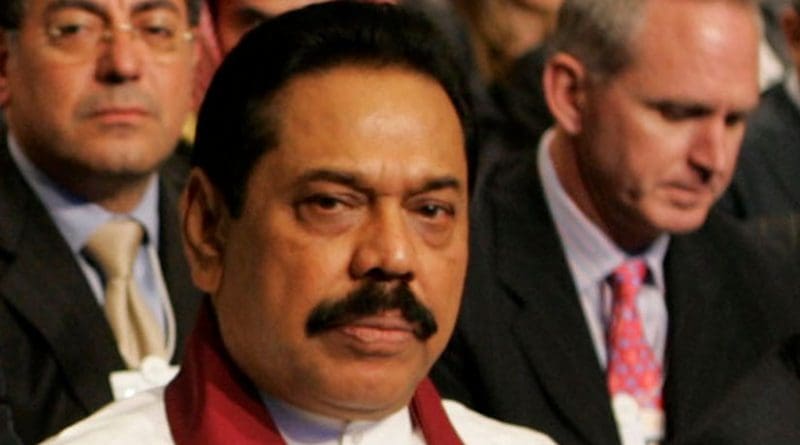Sri Lanka Elections: A Vote For Reconciliation Process – Analysis
By Sridhar Krishnaswami
The defeat of former President Mahinda Rajapakse’s coalition in the recent elections in Sri Lanka is a decisive vote on the part of the people to continue with the reconciliation process that has been set in motion by the current President, Sirisena. That Mr. Rajapakse conceded defeat saying it was a good political fight is beside the point. What has to be factored in is that his coalition failed to garner sufficient votes in most of the electoral districts.
The possible return of Mr. Rajapakse to the helm of affairs as Prime Minister would have meant many things to him, his followers and Sri Lanka even as the President gave assurances against such apprehensions.
First it could have meant a return to the unease of the past where Mr. Rajapakse and his coterie would have been made to come to terms with many ugly things that went on in the final phases of an ethnic conflict that ripped apart the island nation.
Second, it could have also meant the return of an apprehension about what the ultra-right wing Buddhist clergy groups might foment against the minorities in the country, especially the Muslims.
Third there could have also been a possibility of constant political fight between the supporters of Mr. Rajapakse and his detractors on charges of corruption and nepotism. In fact, it can be argued that even though the present Prime Minister has said that the time has come for a genuine reconciliation process, it is not sure if the charges against the Rajapakse family will fade away so easily.
Fourth, Mr. Rajapakse’s return could have revived yet another international debate and focus on issues of war crimes and genocide that was fiercely talked about in United Nations’ sponsored Human Rights forums. Not that this aspect is about to drop from the radar screens anytime soon, but the international community has taken on face value the commitments given by the new dispensation in Colombo—after all what has been asked of Sri Lanka since the time of the Rajapakse regime was a genuine and sincere attempt to probe the allegations. What the international community did not accept—and is unlikely to do so in the future as well—is the Sri Lankan military heading the inquiry and absolving itself of any wrong doing.
Fifth, the national reconciliation process itself would have been derailed if Mr. Rajapakse and Company had returned to power in this parliamentary election. It was natural for the Tamil parties to take an anti-Rajapakse stance and to support those who opposed the former President for the track-record that is well known.
Even in this campaign trail, the former President was playing the security and Tamil Tigers cards quite cleverly—the bogey of a weakened internal security environment and the prospects of a possible “return” of the Tamil Tigers.
Sixth, the return of Mr. Rajapakse would have been a strategic and security headache to India and to certain extent the United States as well. Since the final phase in the ethnic conflict, Mr. Rajapakse has been moving closer to China, not only from a commercial sense but also from a strategic point of view. And he had this habit of waving the China card—and to some extent that of Pakistan as well—when things were not going well between Colombo and New Delhi.
Bringing China in a close network with Sri Lanka was something that India had to factor in as also Washington. Of some comfort now is the readiness of the present dispensation in Colombo to “re-balance” its ties with Beijing.
It is time for some deep reflection within Sri Lanka. On the one hand the democratic process has been well managed and with very little violence. That is itself a credit to a country and its people that have witnessed traumatic times for close to three decades. That Mr. Rajapakse will be a Member of Parliament and is quite strong within the Sinhala community means that Sri Lanka will witness some heated debates and anxious moments when issues are talked about nationally and internationally. The onus is, however, on the Sirisena government to put in place a mechanism that satisfies not only all the Tamils but also international agencies that have been calling for accountability for quite some time now.
*Dr. Sridhar Krishnaswami is Head, Department of Journalism and Mass Communications, SRM University, Chennai. He can be reached at [email protected].


The former Lankan President Mahinda Rajapaksa governed with assistance from an inner circle of kith and kin and an outer circle of loyal sycophants. Mahinda did not bridle corruption, nepotism and culture of impunity to take firm roots. Was this deliberate? Mahinda became more and more intolerant towards dissents and towards this he unnecessarily kept increasing the strength of the armed services. Lankans decided to act. They snubbed him in the January Presidential election. He tried a comeback via the 17 August parliamentary elections but the Lankans said “No”. The vote was fore mostly to get to the bottom of corruption allegations. If the new government succeeds in this effort rule of law will prevail. Reconciliation will logically follow. If the new government shields the corrupt we are back to square one.
There is no reconciliation without accountability, apply the full force of rule of law and the delivery of justice without any bias and discrimination.
No internal investigation will be credible and no criminal can conduct fair investigation. Thus only an independent international and acceptable investigation can bring meaningful reconciliation. Tamils have no confidence in many North Indian leaders and the Malayalee mafias as they collaborated with the Sri Lankan regime in committing war crimes, human rights violations and thus, India should stay away from meddling with the investigation. After Mrs. Indra Gandhi, India did not have a leader that the Tamils have confidence, trust and rely on. Indian meddling at present means no peace in Sri Lanka.